|
|
|
Sort Order |
|
|
|
Items / Page
|
|
|
|
|
|
|
| Srl | Item |
| 1 |
ID:
171957
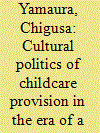

|
|
|
|
|
| Summary/Abstract |
The shortage of public childcare in Japan – called the “waitlisted children problem” (taiki jidō mondai) – has assumed increasing visibility and salience over the last several decades. This essay analyzes how this “waitlisted children problem” has been conceived, narrated, and addressed within the specific political, economic, and historical context that is contemporary Japanese society. Going beyond discussions of gender inequality in the workplace and home, the paper interrogates the cultural logics underpinning the recent urgency of debates over public childcare provision in Japan. The key to understanding these developments is recognizing how Japanese women's reproductive desires have become objectified within official and popular discussions as obstructed and requiring emancipation. Correspondingly, promoting gender equality by expanding childcare provision has become a tool of bio-political intervention, a means to remove a statistically calculated inhibition of women's reproductive desire. This links childcare with Japan's national survival, and thus helps to explain how both official and popular debates have converged in seeing the issue as significant and pressing.
|
|
|
|
|
|
|
|
|
|
|
|
|
|
|
|
| 2 |
ID:
171959
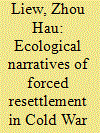

|
|
|
|
|
| Summary/Abstract |
This article examines the forced resettlement of more than 500,000 ethnic rural Chinese during the Malayan Emergency that lasted from 1948 until 1960. The phrase “winning the hearts and minds of the people” encapsulates the British narrative of economic uplift and development, evident from the naming of sites that rural Chinese were moved to as “New Villages.” This justification of Cold War counterinsurgency strategy through development is apparent in the British pamphlet, “The Story of Permatang Tinggi New Village,” which casts rural Chinese as a primitive people without history, transformed into productive and loyal citizens after resettlement. Yet, oral histories and cultural productions by resettled villagers challenge this, as seen in the essays and poetry of villager Wong Yoon Wah. Whereas the British presented rural Chinese as rootless squatters, Wong portrayed another world in which the longstanding Nanyang connection to the ecology of the tropics manifest in fish who live in ponds beside tin mines, and bats whose night time flights of pollination are upset by the chaos of the Emergency. His writings counteract “hearts and minds” by reclaiming the rural jungle in which they worked and lived as homelands lost to British resettlement.
|
|
|
|
|
|
|
|
|
|
|
|
|
|
|
|
| 3 |
ID:
171954
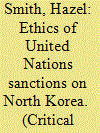

|
|
|
|
|
| Summary/Abstract |
If the legal foundation and political consensus underpinning United Nations resolutions suggests that North Korea's denuclearization can be understood as a just cause, were the means used by the United Nations also just? This essay draws on jus in bello analogies to analyze UN sanctions via standard ethical criteria of effectiveness, necessity and proportionality. It shows that UN sanctions did not fulfill the effectiveness criterion as they were never likely to result in the denuclearization of North Korea. The necessity condition was strained as the alternative instrument of diplomacy was not utilized in a sustained manner. Expanded sanctions from 2016 did not distinguish between the military and civilian economies. Stringent energy sanctions introduced in 2017 contributed significantly to a precipitous fall in agricultural production in 2018 such that the country could no longer feed about a third of the 25 million population. Post-2016 UN sanctions did not meet the proportionality criterion as they jeopardized the food security of millions of innocents. The DPRK government has primary responsibility for the welfare of its citizens but this assumption does not abrogate the responsibilities of others. Broad UN sanctions on the DPRK are neither effective nor proportionate and are, therefore, unethical.
|
|
|
|
|
|
|
|
|
|
|
|
|
|
|
|
| 4 |
ID:
171955
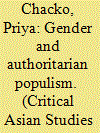

|
|
|
|
|
| Summary/Abstract |
The promotion of conservative gender values has been a feature of the rise of authoritarian populism globally. This paper argues that India’s ruling Bharatiya Janata Party (BJP) uses populist strategies to promote a political project of marketized Hindutva, which melds neoliberalism and Hindu nationalism and appeals to men and women in distinctive ways. This reflects the gendered nature of neoliberalism, electoral imperatives and the patriarchal gender values of Hindu nationalism. Using populist discursive and mobilizational strategies, the BJP aims to suture together a broad social base, represented as “the people,” through the creation of an aspirational identity. Concurrently, it stokes resentment against establishment elites and religious minorities for holding back the people’s aspirations. This politics of resentful aspiration underpins an empowerment agenda of marketized social policies targeted at turning poor and lower-middle class women into virtuous market citizens who embody neoliberal rationalities and Hindu nationalist social values. It also drives a protection agenda mobilizing young, lower-middle class men and the strong arm of the state to protect women’s capacity to become virtuous market citizens. These agendas claim to empower and protect women but are deeply disempowering for the women and men they target and contain inherent contradictions.
|
|
|
|
|
|
|
|
|
|
|
|
|
|
|
|
| 5 |
ID:
171958
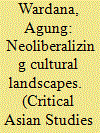

|
|
|
|
|
| Summary/Abstract |
In Bali, rapid conversion of agricultural land has been framed by opinion leaders and mass media as an indication of an agrarian crisis. The government responded by nominating subak (a traditional water management system) landscapes for world heritage status, which was achieved in 2012. Instead of mitigating land conversion, world heritage status has incentivized local farmers to sell their agricultural land. This article examines market-based conservation strategies by investigating their conceptual foundation. It argues that a romantic characterization of subak, combined with neoliberal assumptions which conceive of the land crisis in Bali through a rational choice lens, has led to a counter-productive market-based solution managed in a technocratic manner, ignoring the structural conditions which have been the main cause of land conversion. Thus, the neoliberal response to Bali’s agrarian crisis, rather than conserving subak landscapes and empowering local farmers, has contributed to the further marginalization of local farmers and their landscapes.
|
|
|
|
|
|
|
|
|
|
|
|
|
|
|
|
| 6 |
ID:
171953
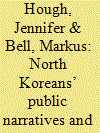

|
|
|
|
|
| Summary/Abstract |
This article draws on the public testimonies of North Koreans living in South Korea (t’albungmin) and analyzes the role that these narratives play in South Korean society as mechanisms of inclusion and exclusion. North and South Korea technically remain at war, with South Korea claiming sovereignty over the entire Korean peninsula. While t’albungmin are eligible for South Korean citizenship, they describe feeling excluded from full social membership. Although some t’albungmin seek anonymity, this paper considers those who gain social status by speaking publicly about their lives and denouncing the North Korean regime. In so doing, they distance themselves from North Korea and align themselves with the “good” discourse of human rights. However, their actions reinforce a logic of exclusion, implying that t’albungmin who prefer anonymity are “sympathizers” of the North and consequently restricting their access to social benefits and resources. This case of conditional inclusion illuminates tensions that arise when a sovereignty claim entails the incorporation of people from an enemy state. It also highlights the carefully delineated boundaries of publicly acceptable behavior within which “suspect” citizens must remain as a condition for positive recognition.
|
|
|
|
|
|
|
|
|
|
|
|
|
|
|
|
| 7 |
ID:
171956
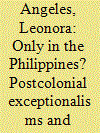

|
|
|
|
|
| Summary/Abstract |
Exceptionalism as a framing discourse reveals socio-historical insights on postcolonialism and postnationalism, providing fertile ground for articulating and investigating the multiplicities and historical vicissitudes constituting Filipina feminist articulations of social identities and engagements with multi-scalar politics. Historical and contemporary Philippine/Filipino exceptionalism claims have inspired and galvanized transnational feminist spaces, processes, and practices, creating ideoloscapes (ideologies and discourses) and practiscapes (actions). Using framing theory to compare exceptionalisms’ discursive practices and their entanglements with feminisms, this paper analyzes episodic historical accounts, documents, and interviews with feminist leaders to demonstrate how Filipina feminists mobilize exceptionalisms as reference frames in different logics, spaces, and political opportunities. It examines three framing episodes of Filipina feminist politics – suffragist frames during the American colonial period, nationalist feminists’ frames from the Marcos to the Duterte presidencies, and transnationalist (state) feminists’ frames within multi-scalar spaces and the context of imperial and other exceptionalism variants. These episodic framing practices demonstrate the formation and reproduction of dominant feminist politics and publics that have yet to acknowledge their shared traumatic histories and fully decolonize their narratives and engagements.
|
|
|
|
|
|
|
|
|
|
|
|
|
|
|
|
|
|
|
|
|